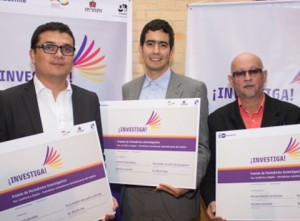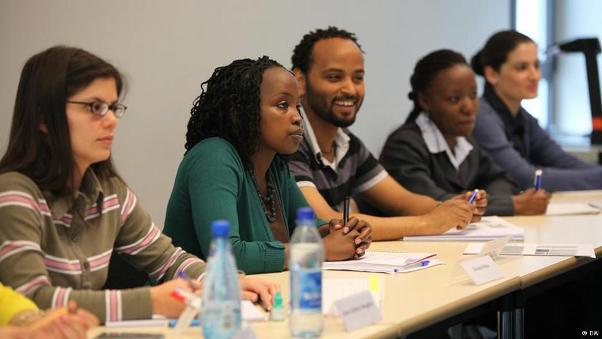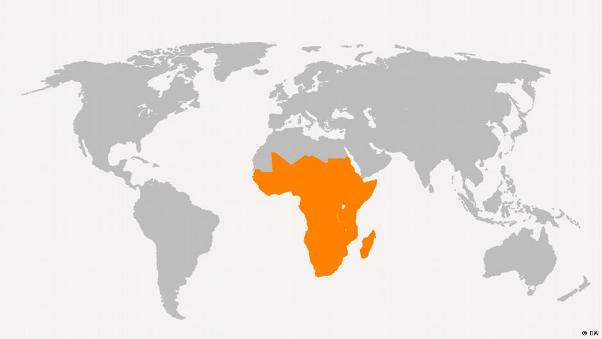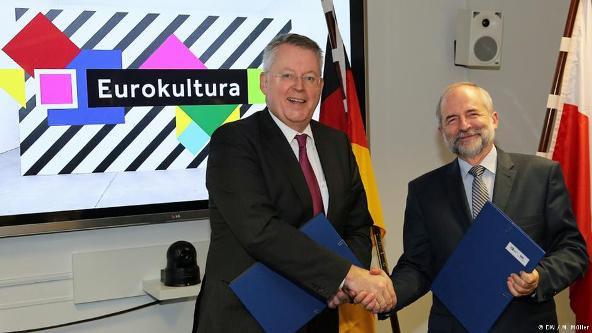How to bring together theory and expertise to train international journalists
Many journalism degree programs can miss providing students with a clear set of skills to be effective in the workforce. Many universities, especially in developing nations, lack the technical resources to provide students with these skills, leaving that part of their education to internships, which are not always structured or guarantee that the student will acquire practical expertise.
Journalism does not exist in a vacuum. It’s essential that journalists, especially those working in international contexts, understand the different social, political and economic frameworks in which events play out – but an educated mind requires educated hands.
DW Akademie, in cooperation with universities in Bonn, puts the resources of a world-class broadcaster in the hands of students. Those who earn a place in the International Media Studies (IMS) Master of Arts program receive a one-of-a-kind educational opportunity, combining the professional competence of DW with the high academic standard at the University of Bonn and the Bonn Rhein-Sieg University of Applied Sciences.
IMS takes a theoretical approach and backs it up with practical experience leaving graduates with a cohesive skill set that will enable them to know what they are doing and why. The curriculum includes everything from media systems and media management to globalization and development studies – all combined with hands-on projects.
The students are another important part of what makes IMS special: They come from all over the world. IMS is aimed at aspiring media professionals from developing countries who will be able to put their education to work where it is needed most.
The wide-range of master’s theses attest to the diversity of each IMS class. Two recent graduates produce Multicoolty, an entertaining blog that profiles life in Germany from the perspective of foreigners. Another group of students worked on a research project examining press coverage of Egypt. Intriguing research on international media is also published in the context of IMS.
IMS is currently accepting applications for the upcoming class. Important information from the program requirements to costs and logistics can be found in the FAQ. If you are interested in becoming an IMS student, don’t miss this unique opportunity. Prospective students have until March 31, 2015 to apply.
How to unlock the full potential of online video even on low-quality networks
There is a high demand for quality media in Africa but in many places network infrastructure cannot keep up. A positive aspect of this technological disparity is that it promotes the development of alternative services, which provide access to media by getting around network deficiencies. Launched in January 2012, Tuluntulu (which means stream in Zulu) opens the floodgates to a reservoir of uninterrupted television streams on mobile devices– even in locations with low-bandwidth networks.
Now DW’s flagship English channel will be included Tuluntulu catalogue. This new partnership will bring world-class programming and information to a hard-to-reach audience. With partners on board like DW, no one has to miss out on quality content because of technological deficiencies.
Tuluntulu works by using Adaptive Real-time Internet Streaming Technology (ARTIST), which allows content to stream at low data consumption levels. The service was developed specifically as a platform for the technology. The company claims that ARTIST technology can provide unbroken streaming video at the low broadband speed of 30kbps adding that no other service can provide video under 100 kbps. With its wide-selection of networks, Tuluntulu is truly a breakthrough for mobile media in Africa. The service is free to download right now for iOS or Android devices.
This is only the beginning of developing these technologies and DW is an integtral part of what makes them so important in providing information to those who need it in a place they couldn’t find it before.
Market roundup: January 2015
Online
DW news in 12 languages are included in the newly-launched MSN news apps. This makes online content from DW not only available on all Windows mobile handsets and msn.com, but also expands the reach to iOS and Android devices.
Asia
Onneshon is now available in India and Bangladesh. The science show that is broadcast in Bengali will be made available in Eastern India on Doordarshan Bangla (DD Bangla).
Europe
A weekly version of Euromaxx is now being produced and broadcast in Ukrainian. The new adaptation of the classic show is being produced in cooperation with ZIK-TV, with which DW has been working with since the beginning of 2014. ZIK-TV also rebroadcasts Geofaktor and Focus on Europe.
South America
The culture magazine Camorote.21 is now being broadcast nationwide in Brazil by TV Brasil. The public broadcaster is part of the EBC (Empresa brasileira de comunicação) and focuses on informational and cultural programming.
Market roundup: December 2014
South America
 For the third time, DW Akademie has awarded its ¡Investiga! along with the Universidad del Norte in Bogota, Colombia. The prize for journalistic excellence is supported by CdR – an independent association of journalists in Bogota. This year, three pieces of research were presented, which all had to do with the topics of “peace, conflict and region”. David Gonzalez project about the murdered journalist Luis Eduardo Gomez and his murdered son was the winner of the ¡Investiga! this year. Alfonso Hamburger took second and Felipe Motoa placed third. As the contest’s winner, Gonzalez will be flown to Berlin to take part in a workshop, as well as going to Bonn to work side-by-side with online journalists in DW’s Spanish department.
For the third time, DW Akademie has awarded its ¡Investiga! along with the Universidad del Norte in Bogota, Colombia. The prize for journalistic excellence is supported by CdR – an independent association of journalists in Bogota. This year, three pieces of research were presented, which all had to do with the topics of “peace, conflict and region”. David Gonzalez project about the murdered journalist Luis Eduardo Gomez and his murdered son was the winner of the ¡Investiga! this year. Alfonso Hamburger took second and Felipe Motoa placed third. As the contest’s winner, Gonzalez will be flown to Berlin to take part in a workshop, as well as going to Bonn to work side-by-side with online journalists in DW’s Spanish department.
DW’s magazine about culture and the arts that was developed for Portuguese-speaking audiences has now been taken on by a new partner. Viewers throughout Brazil can now tune in to Camarote.21 on the Canal Futura. Part of the GLOBO media group, it’s the first, private TV channel in Brazil that exclusively broadcasts educational content. Canal Futura reaches 66 million households nationwide in Brazil.
Asia
Okto, Singapore’s public broadcaster, will is including Arts.21 and Euromaxx Highlights into its lineup. Okto is available nationwide in Singapore and due to its availability on platforms like Singtel and Starhub, is one oft he most popular in the country.
Shan Cable Network and Global Cable Network in Pakistan are now broadcasting DW’s English channel. These new partnership deals will make DW available in an additional 105,000 housholds.
Strengthening ties between neighbors through sharing media
Building on 15 years of successful cooperation, DW and Polish public broadcaster TVP have laid the groundwork for future projects with a new cooperation agreement signed earlier this month.
The agreement was signed after a public preview of DW and TVP’s latest collaborative project, Learn Polish, at the Checkpoint Charlie museum in Berlin. Learn Polish tells the story of solidarity between the Polish trade unionist movement, Solidarność, and East German oppositionists during the 1980s. DW started broadcasting the documentary in English, German and Spanish on November 5. TVP will begin broadcasting the Polish version on December 15.
Another recent collaborative project from DW and TVP is the Polish-language documentary format Eurokultura. The program features DW reports adapted into Polish which are then sent to Warsaw and put together by TVP into a 15-minute show. Eurokultura premiered October 5. Each show is also available on DW’s Polish website.
Both broadcasters are looking forward to working together in the future. DW Director General, Peter Limbourg, said that DW could potentially expand its cooperation with TVP by providing news content. TVP Director General, Juliusz Braun expressed interest in continuing with the German-Polish multimedia project, Nachbar– Wie geht’s? (How are you neighbor?), which aired earlier this year. The format was produced in cooperation with the Leipzig-based German public broadcaster, MDR. It compares the lifestyles of a German family from Erfurt with a Polish family from Łomża, north of Warsaw. The portrayal of everyday life in Germany and Poland brings to light the common values shared by the two families and both nations.
DW’s ongoing cooperation with TVP reflects the role of cooperative broadcasting in enhancing European integration. Limbourg commented that these projects were important for, “the German-Polish neighborhood, for Europe and for the values of freedom and democracy.”
As the representative for Germany in the international media landscape, DW has a unique role in creating and promoting content that can help bring Europe closer together by highlighting shared values and common goals which know no borders.











Feedback